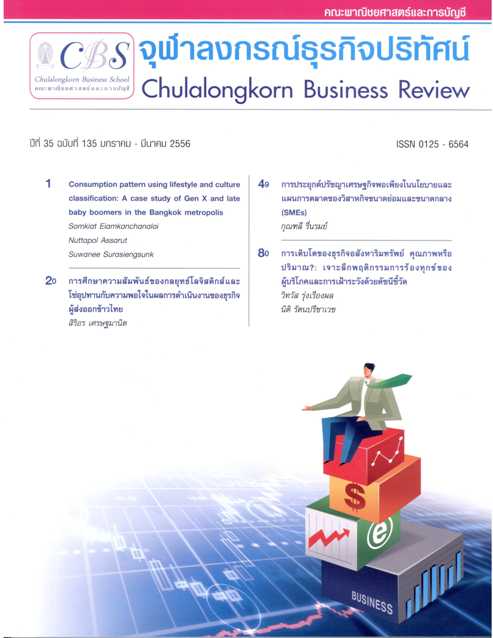การเติบโตของธุรกิจอสังหาริมทรัพย์ คุณภาพหรือปริมาณ?: เจาะลึกพฤติกรรมการร้องทุกข์ของผู้บริโภคและการเฝ้าระวังด้วยดัชนีชี้วัด
Main Article Content
Abstract
บทคัดย่อ
การวิจัยครั้งนี้เป็นรูปแบบการวิจัยในลักษณะของการวิจัยเชิงสำรวจแบบระยะยาว (Survey and Panel Study) มีวัตถุประสงค์เพื่อ 1) ศึกษาถึงปัจจัยที่มีอิทธิพลต่อพฤติกรรมการร้องทุกข์ของผู้บริโภคในธุรกิจอสังหาริมทรัพย์ 2) ศึกษาถึงพฤติกรรมการร้องทุกข์ของผู้บริโภคในธุรกิจอสังหาริมทรัพย์ 3) สร้างดัชนีมาตรฐานในการชี้วัดการร้องทุกข์ของผู้บริโภคในธุรกิจอสังหาริมทรัพย์ ดำเนินการรวบรวมข้อมูลเชิงปริมาณในระดับบุคคลจากข้อมูลการร้องทุกข์ที่ได้จากศูนย์รับเรื่องราวร้องทุกข์ สำนักงานคณะกรรมการคุ้มครองผู้บริโภค (สคบ.) วิเคราะห์ข้อมูลเชิงปริมาณรวมถึงการวิเคราะห์รายละเอียดเนื้อหา (Content analysis) ของการร้องทุกข์ในเชิงคุณภาพด้วยการสัมภาษณ์เชิงลึก (In depth interview) แบบมีโครงสร้าง (Structural interview) กับผู้ประกอบการ ผู้บริโภค และหน่วยงานที่เกี่ยวข้อง นอกจากนี้จัดให้มีการรับฟังความคิดเห็นต่อการนำเสนอผลการวิจัยเพื่อร่วมอภิปรายผลการวิจัยเชิงปริมาณที่ได้ และจัดทำดัชนีชี้วัดการร้องทุกข์ของผู้บริโภคในธุรกิจอสังหาริมทรัพย์ (Real Estate Consumer Complaint Index: RECCI) รายไตรมาสเพื่อสังเกตการณ์แนวโน้มจำนวนการร้องทุกข์ ผลการวิจัยพบว่า ประเด็นในการร้องทุกข์มีในหลายลักษณะซึ่งโดยภาพรวมแล้วได้แก่ การร้องทุกข์ในด้านการไม่เป็นไปตามโฆษณาและสัญญา การก่อสร้างไม่แล้วเสร็จ ปัญหาเงินดาวน์ เงินประกัน และคุณภาพของงานก่อสร้าง ตามลำดับ โดยประเภทองค์กรผู้พัฒนาโครงการและลักษณะของอสังหาริมทรัพย์มีผลต่อความแตกต่างในประเด็นการร้องทุกข์ นอกจากนี้ แนวโน้มของดัชนีชี้วัดการร้องทุกข์ในธุรกิจอสังหาริมทรัพย์แสดงให้เห็นว่าในสภาวะการณ์ปัจจุบันยังคงมีความผันผวนในประเด็นการร้องทุกข์ต่าง ๆ อยู่อย่างมากในช่วง 4 ไตรมาสของการศึกษา
คำสำคัญ: พฤติกรรมการร้องทุกข์ของผู้บริโภค ดัชนีชี้วัดการร้องทุกข์ ธุรกิจอสังหาริมทรัพย์ สำนักงานคณะกรรมการคุ้มครองผู้บริโภค (สคบ.)
Abstract
This research is survey and panel study; aims 1) to study factors influencing consumer complaint behavior in real estate business 2) to study consumer complaint behavior in real estate business 3) to accommodate Real Estate Consumer Complaint Index or RECCI collecting quantitative data in personal level of consumer complaint data from Office of the Consumer Protection Board (OCPB) with census sampling technic during the 3rd and 4th quarter of year 2011 and the 1st and 2nd of year 2012 from 1,779 complaints of population. Content analysis is qualitatively applied with structural in depth interview technic with developers consumers as well as related organizations. Moreover, public hearing from professional stakeholders is conducted in objective of discussion the quantitative results. On the other hand, to appoint RECCI quarterly in order to monitor the trend of consumer complaint numbers. The research result indicates that the most complaint issues sequently combine of 1) not conform to advertisement and agreement 2) not finished construction 3) dow payment and retention issues and 4) construction quality. Organization types of developers and property types lead to the difference of consumer complaints. Lastly, the trend from RECCI shows inconsistency of consumer complaints during 4 quarters of the study.
Keywords: Consumer Complaint Behavior (CCB), Real Estate Consumer Complaint Index (RECCI), Real Estate Business, Office of the Consumer Protection Board (OCPB)
Article Details
Opinions and discussions in papers published by the Creative Business and Sustainability Journal (CBSJ) are deemed as personal opinions and the responsibility of the writers. They are not the opinions or responsibility of the Chulalongkorn Business School of Chulalongkorn University.
Papers, content, information etc. appearing in the Journal are deemed to be the copyright property of the Chulalongkorn Business School of Chulalongkorn University. Anybody or any organization that wishes to publish any part of them or use them in any way must obtain written permission from the Chulalongkorn Business School, Chulalongkorn University.


